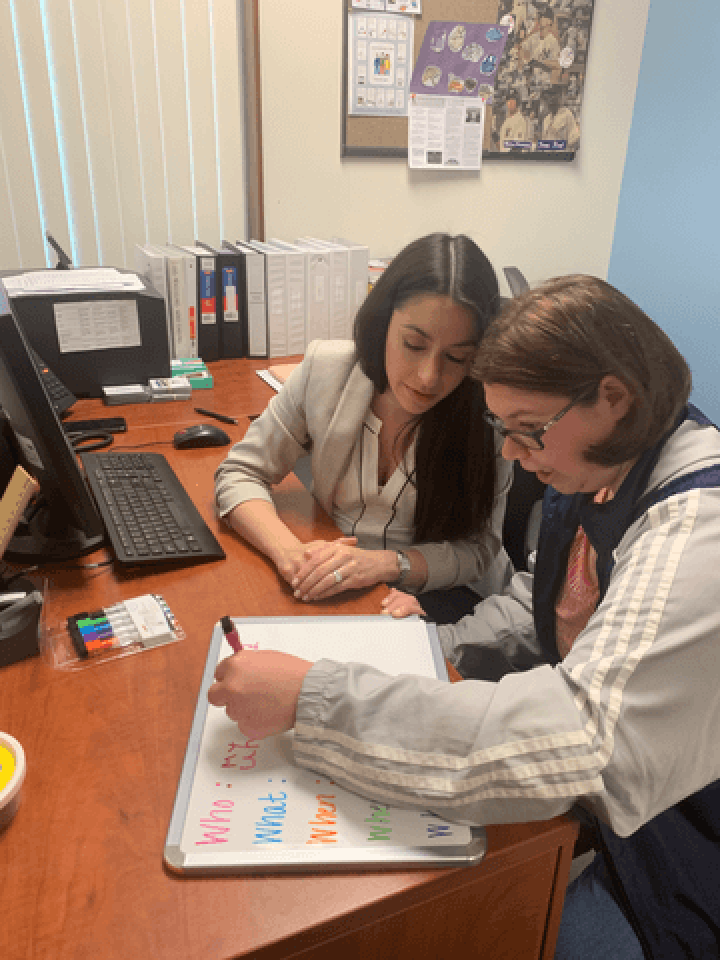Share

Mary Cronin, a woman who attends YAI Brentwood’s Day Habilitation Program, is eager to share her stories. Between her many interests and large network of friends and family, she has no shortage of material. However, translating her experiences into words has often been difficult.
Fortunately, Cronin is finding a way to tackle these challenges with help from YAI's Center for Specialty Therapy speech therapy services. The Center for Specialty Therapy offers an array of services, including psychological testing and occupational, physical, and speech therapy to people with intellectual and developmental disabilities (I/DD).
“Speech therapy is a little bit of a misnomer because it encompasses so much more than how we speak,” said Dara Caruana, a Senior Speech Language Pathologist at YAI. “We don’t just teach people how to articulate sounds, but we also work on everything from improving low muscle tone that causes mushy-sounding speech to making sure that people get enough breath support to project their voice. We also help a lot of people build their vocabulary and increase their phrase length.”
For some with I/DD, relating the details of a story can be tough. Cronin often knows what she wants to say, but sometimes the words don’t come out as planned. She is also learning ways to remember key details when communicating. Focusing on these details by writing them down or discussing them beforehand can help when recounting experiences.
“Writing down the words has been easy,” Cronin said. “That way, I don’t forget what I want to say.”
Using full, grammatically correct sentences is also an important part of storytelling. While everyone uses incorrect grammar sometimes, too many errors can lead to major communication breakdowns.
As it turns out, grammar is one of Cronin’s favorite topics. “I like it, I feel pretty good when I’m learning it,” she said. “You never trick me. You can’t stump me.”
Unstumpable. That’s how everyone who works with Cronin describes her. After three years of speech therapy, there isn’t an irregular past tense verb she can’t identify or a noun she can’t embellish with the best possible adjective. With some practice and assistance, Cronin has learned to convey her thoughts in a way that her listeners can understand.
According to Caruana, being understood lies at the heart of all speech therapy.
“Whether using spoken words or alternative communication devices like iPads and picture books, we work to find ways that help people communicate their needs and wants,” she said. “When people are able to effectively communicate, we see a big decrease in the frustration that comes when they are unable to express themselves.”
In addition to vocabulary, grammar, and adaptive tools for telling detailed, informative stories, speech therapy helps people with I/DD understand the figurative language they hear every day.
Have you ever put your foot in your mouth? What about the time it rained cats and dogs? What if you heard these expressions and thought that I had literally put my foot in my mouth or that cats and dogs had fallen from the sky? That would be confusing, to say the least. Cronin used to be among the many people with I/DD who struggle with figurative language. But now?
“My speech therapy lessons are a piece of cake,” she said.
With her improved communication skills, Cronin is more sociable than ever, connecting with loved ones, and sharing her stories in a way they can understand.
“For people we support, there’s a huge increase in the quality of life and sense of personal pride when they are able to communicate more effectively with the people in their lives,” Caruana said. “Moreover, speech therapy can increase their chances of getting a job, make them safer in the community, and enable them to better advocate for themselves, leading to a more independent life.”
The speech therapists at Center for Specialty Therapy leave no stone unturned, no matter a person’s apparent level of ability. When it comes to communicating thoughts, feelings, needs, and experiences, there’s always more to say. Speech Therapists make sure that people with I/DD have every tool they need to do so.
To learn more about YAI’s Speech Therapy and other services, please visit the Speech Therapy page.
